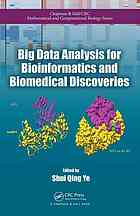

Most ebook files are in PDF format, so you can easily read them using various software such as Foxit Reader or directly on the Google Chrome browser.
Some ebook files are released by publishers in other formats such as .awz, .mobi, .epub, .fb2, etc. You may need to install specific software to read these formats on mobile/PC, such as Calibre.
Please read the tutorial at this link: https://ebookbell.com/faq
We offer FREE conversion to the popular formats you request; however, this may take some time. Therefore, right after payment, please email us, and we will try to provide the service as quickly as possible.
For some exceptional file formats or broken links (if any), please refrain from opening any disputes. Instead, email us first, and we will try to assist within a maximum of 6 hours.
EbookBell Team

0.0
0 reviewsBig Data Analysis for Bioinformatics and Biomedical Discoveries provides a practical guide to the nuts and bolts of Big Data, enabling you to quickly and effectively harness the power of Big Data to make groundbreaking biological discoveries, carry out translational medical research, and implement personalized genomic medicine. Contributing to the NIH Big Data to Knowledge (BD2K) initiative, the book enhances your computational and quantitative skills so that you can exploit the Big Data being generated in the current omics era.
The book explores many significant topics of Big Data analyses in an easily understandable format. It describes popular tools and software for Big Data analyses and explains next-generation DNA sequencing data analyses. It also discusses comprehensive Big Data analyses of several major areas, including the integration of omics data, pharmacogenomics, electronic health record data, and drug discovery.
Accessible to biologists, biomedical scientists, bioinformaticians, and computer data analysts, the book keeps complex mathematical deductions and jargon to a minimum. Each chapter includes a theoretical introduction, example applications, data analysis principles, step-by-step tutorials, and authoritative references.
Features
• Covers the most important topics of Big Data analysis in biomedicine and biology
• Introduces computing tools for Big Data analysis, such as Linux-based command lines, Python, and R
• Presents data analysis pipelines for next-generation DNA sequencing applications, including Genome-seq, RNA-seq, Microbiome-seq, Methylome-seq, miRNA-seq, and ChIP-seq
• Shows how to integrate high-dimensional omics data, pharmacogenomics data, electronic medical records, in silico drug findings, and literature-based knowledge for precision medicine